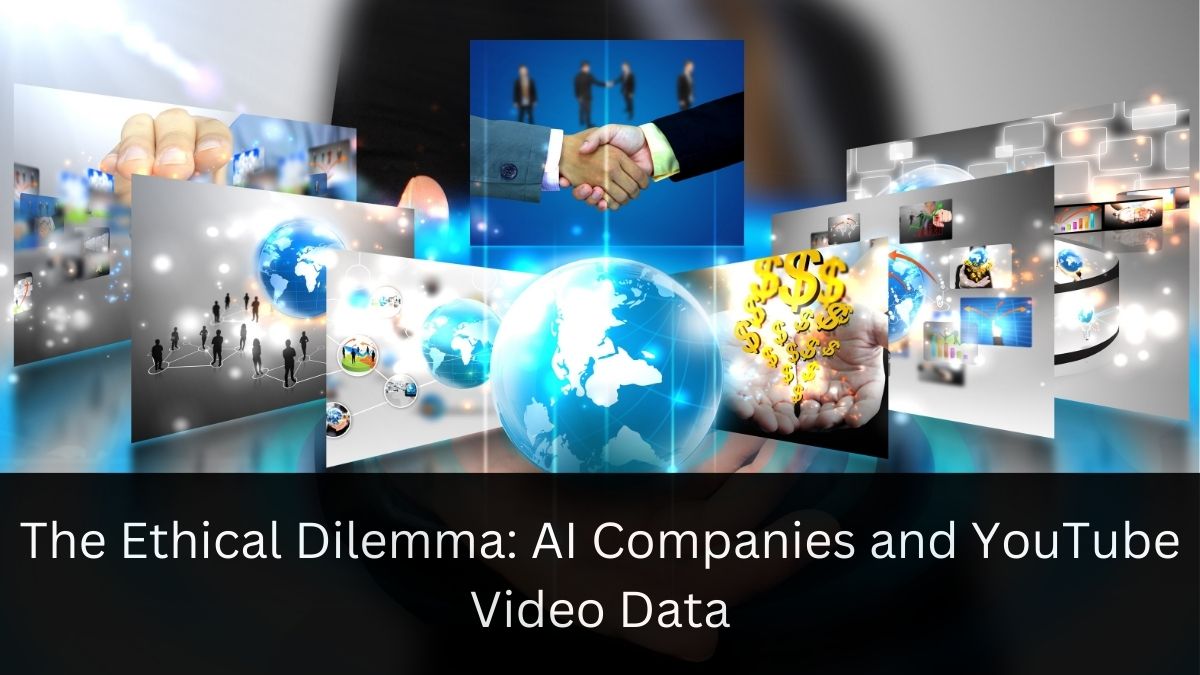AI
The Ethical Dilemma: AI Companies and YouTube Video Data

In the rapidly evolving world of artificial intelligence, a contentious issue has emerged that pits tech giants against content creators. Recent investigations have revealed that some of the most prominent AI companies have been using YouTube videos as training data for their models, often without the knowledge or consent of the creators. This practice raises important questions about intellectual property rights, fair compensation, and the future of content creation in an AI-driven world.
The Scope of the Issue
An investigation by Proof News uncovered a startling fact: subtitles from over 173,000 YouTube videos, sourced from more than 48,000 channels, were used by major tech companies to train their AI models. This list includes industry heavyweights such as Anthropic, Nvidia, Apple, and Salesforce.
The dataset in question, known as “YouTube Subtitles,” contains transcripts from a wide variety of channels, including:
- Educational content from Khan Academy, MIT, and Harvard
- News outlets like The Wall Street Journal, NPR, and the BBC
- Popular late-night shows such as “The Late Show With Stephen Colbert” and “Jimmy Kimmel Live”
- YouTube celebrities like MrBeast, Marques Brownlee, and PewDiePie
What’s particularly concerning is that many of these creators were completely unaware that their content was being used in this manner.
The Creator’s Perspective
For content creators, this revelation has come as a shock. David Pakman, host of “The David Pakman Show,” expressed his frustration upon learning that nearly 160 of his videos were included in the training dataset:
“No one came to me and said, ‘We would like to use this,'” Pakman stated. “This is my livelihood, and I put time, resources, money, and staff time into creating this content.”
This sentiment is echoed by many creators who feel that their hard work is being exploited without proper compensation or acknowledgment.
The Potential Impact on Creators
The use of creator content to train AI models raises several concerns:
- Loss of income: If AI can generate content similar to what creators produce, it could potentially reduce their viewership and income.
- Lack of consent: Creators argue that they should have a say in how their content is used, especially when it comes to training AI models.
- Fairness: While some media companies have secured agreements to be paid for the use of their work in AI training, individual creators have been left out of these discussions.
The AI Companies’ Stance
When confronted with these findings, AI companies have offered various responses:
- Anthropic confirmed its use of the Pile dataset (which includes YouTube Subtitles) but deflected responsibility to the dataset’s creators.
- Salesforce acknowledged using the Pile for “academic and research purposes” but emphasized that the dataset was “publicly available.”
- Other companies, like Nvidia and Apple, either declined to comment or did not respond to inquiries.
Many of these companies argue that their use of the data falls under “fair use,” a legal doctrine that allows limited use of copyrighted material without permission for purposes such as commentary, criticism, or research.
The Legal and Ethical Implications
The use of YouTube videos for AI training raises complex legal and ethical questions:
Copyright Concerns
While AI companies argue that their use of the data constitutes fair use, many creators and legal experts disagree. Amy Keller, a consumer protection attorney, points out:
“People are concerned about the fact that they didn’t have a choice in the matter. I think that’s what’s really problematic.”
Data Privacy
The dataset includes subtitles from over 12,000 videos that have since been deleted from YouTube. This raises concerns about data privacy and the right to be forgotten in the digital age.
Bias and Safety
Some researchers have flagged potential issues with the dataset, including profanity and biases against certain groups. This could lead to AI models perpetuating harmful stereotypes or producing inappropriate content.
The Future of Content Creation
As AI technology continues to advance, creators are understandably concerned about their future. Dave Farina, host of “Professor Dave Explains,” summed up the sentiment of many:
“If you’re profiting off of work that I’ve done [to build a product] that will put me out of work or people like me out of work, then there needs to be a conversation on the table about compensation or some kind of regulation.”
Transparency and Fairness
The revelation that AI companies are using YouTube videos for training data without creator consent has opened a Pandora’s box of ethical and legal questions. As we move forward, it’s clear that there needs to be a more open dialogue between tech companies, content creators, and regulatory bodies.
Key considerations for the future include:
- Establishing clear guidelines for the use of publicly available content in AI training
- Developing fair compensation models for creators whose work is used to train AI
- Implementing transparent practices that allow creators to know how and where their content is being used
As we navigate this complex landscape, it’s crucial that we strike a balance between fostering innovation in AI and protecting the rights and livelihoods of content creators. Only through open communication and ethical practices can we ensure a future where both AI and human creativity can thrive harmoniously.
